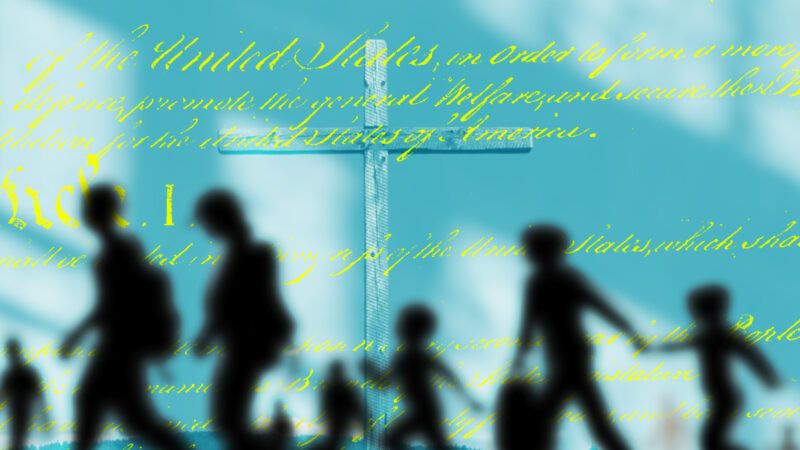Florida Pastors Are Worried This Immigration Bill Could Infringe on Religious Liberties
S.B. 1718 would make it a third-degree felony to “harbor” or “transport” undocumented immigrants. Some Florida faith leaders say it could threaten their church activities.

Florida legislators are considering several bills that would target undocumented immigrants and the Floridians who interact with them. One of the more controversial measures, which is wrapped into Senate Bill 1718, would make it a third-degree felony for Floridians to conceal, harbor, or shield—or transport "into or within" the state—a person who they know "or reasonably should know" is in the United States unlawfully.
"With this legislation, Florida is continuing to crack down on the smuggling of illegal aliens," said Republican Gov. Ron DeSantis. State Sen. Blaise Ingoglia (R–Spring Hill), who introduced S.B. 1718, said the bill "should be the model for all 50 states going forward."
S.B. 1718's supporters have painted the bill as a way to protect Floridians and their rights. But some religious officials in Florida are worried that if S.B. 1718 passes, their work with undocumented immigrants could be criminalized—something they say would represent a violation of their religious liberties.
Joel Tooley takes issue with the bill being framed as an anti-trafficking effort. Tooley is a pastor at Melbourne First Church of the Nazarene and a consultant with the Evangelical Immigration Table, a coalition of evangelical churches and organizations that advocates for immigration reform. S.B. 1718 "is actually a bill that criminalizes normal activities that are irrevocably natural expressions of the work people do as a response to their spiritual calling to show compassion for those in need," he tells Reason.
"As a pastor in Brevard County…I oppose S.B. 1718 because of the threat it is to religious freedom, as well as because of the economic devastation it will bring upon Florida," says Tooley, noting that "faith leaders will most certainly defy" the legislation "if enacted."
"Our concerns are really pastoral. For us, this is not a partisan issue," said Gabriel Salguero, president of the National Latino Evangelical Coalition and an Assemblies of God pastor based in Orlando, in a press conference last week hosted by the Evangelical Immigration Table and World Relief, a Christian humanitarian organization. "In this legislation, some people may have missed that there's religious liberty concerns," Salguero explained. "It can criminalize a pastor transporting one of his parishioners, or one of her parishioners, to church, to Sunday school, to midweek worship."
Federal law already prohibits people from transporting undocumented immigrants "in furtherance of such violation of [immigration] law," but S.B. 1718 has a lower threshold, applying to more routine activities. The bill would make it a third-degree felony for someone to transport or harbor an undocumented immigrant that they know or suspect is undocumented. Under Florida law, that would be punishable by up to five years in prison (and up to 15 years if the transported migrant is a minor). The bill wouldn't apply to migrants who overstayed their visas.
As written, S.B. 1718 doesn't outline exceptions for the activities of churches, which often provide transportation services to parishioners. The language around "harboring" could also prove sticky. Some churches help arrange temporary housing or engage in home-based worship, both of which could be interpreted to fall under S.B. 1718's prohibited activities. Without clarity, Floridians will likely become more hesitant to interact with people who are (or who they suspect to be) undocumented, chilling community ties.
Dale Schaeffer, district superintendent for the Florida District Church of the Nazarene, expressed his concern in last week's press conference that S.B. 1718 could represent a government threat to religious expression. "Our Constitution has strong assurances that government will not restrict the free exercise of religion," said Schaeffer. "The ability to express our religious freedoms, that all people are valuable in God's sight, is essential to the faith of the Church of the Nazarene and any evangelical Christian here in the state of Florida."
The Migration Policy Institute estimates that 772,000 undocumented people live in Florida, making up 4 percent of the state's population. Of the state's undocumented residents, 65 percent have lived in the U.S. for five years or more.
Ingoglia told a Senate panel in March that he wasn't "demonizing immigrants" but rather "demonizing illegal immigrants." Salguero noted in last week's press conference that "several delegations" have gone to Tallahassee to speak with state officials and told Christianity Today that although he has contacted DeSantis' office, he hasn't received a response.
Like many other bills that target undocumented immigrants, S.B. 1718 would negatively impact native-born Americans and criminalize once-mundane interactions. Punishing undocumented immigrants—who are overwhelmingly peaceful residents of Florida, contributing to local communities and economies—shouldn't be done at the expense of religious and civil liberties.
